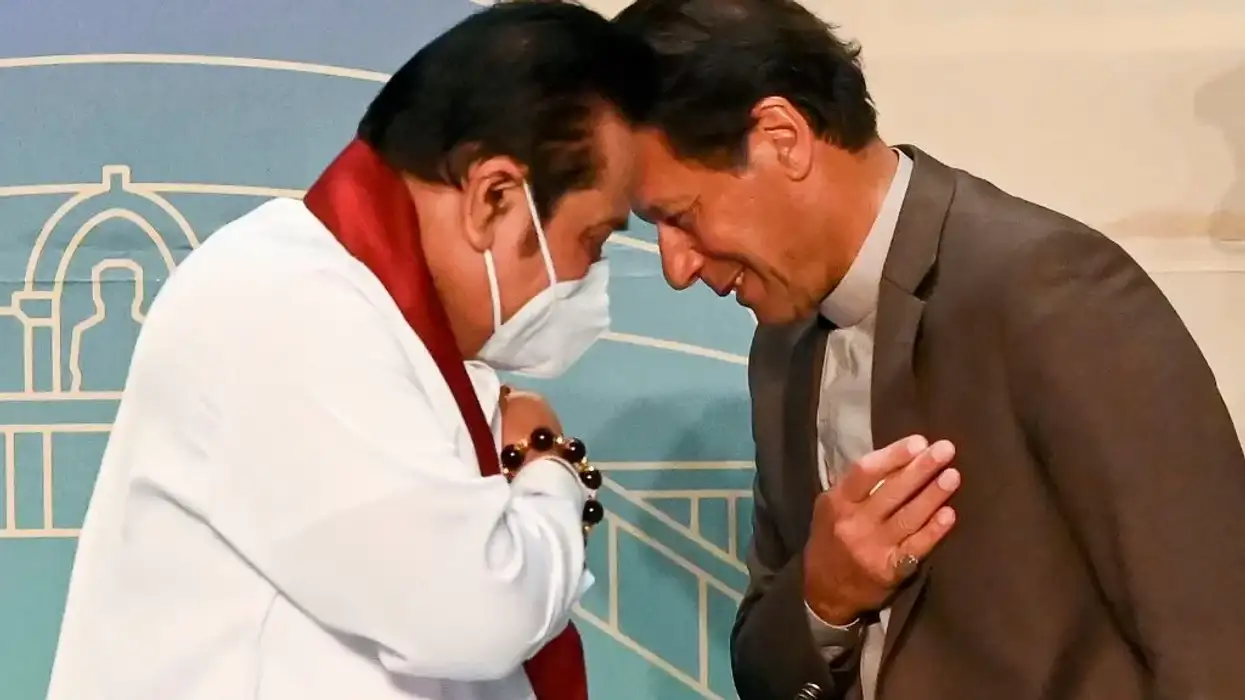PAKISTAN prime minister Imran Khan on Wednesday(24) visited Sri Lankan president Gotabaya Rajapaksa and discussed bilateral ties and common areas of interest, such as trade and tourism.
Khan, who is on a two-day visit, called on Rajapaksa at the presidential secretariat in Colombo and held a one-on-one meeting with him.
"Had a productive discussion with #Pakistani PM @ImranKhanPTI this morning. The discussions were mainly focused on common interests such as Trade, Tourism & adoption of technology in Agriculture which both countries could positively leverage on," president Rajapaksa tweeted after the meeting.
The two leaders also discussed how to exchange technical knowledge to promote agriculture in the two countries.
They also focused on the potential for trade promotion and expansion of investment opportunities between the two countries, reports said.
Khan said that he was looking forward to enhancing trade ties with Sri Lanka through the China-Pakistan Economic Corridor (CPEC), which connects Gwadar Port in Balochistan with China's Xinjiang province.
Foreign Minister Shah Mahmood Qureshi, who is accompanying Khan, said Pakistan has offered Sri Lanka a credit line of $15 million for defence cooperation.
According to Qureshi, trade between the two countries was below potential even though a free trade agreement is in place.
Muslims protest
On Tuesday(23) Sri Lanka's minority Muslims demonstrated in Colombo demanding an end to forced cremations of Covid-19 victims as Imran Khan arrived on an official visit.
Dozens of Muslims carried a mock janazah, or coffin, denouncing the Sri Lankan government's policy of banning burials of virus victims disregarding their funeral rites.
The demonstration was aimed at the visit of Khan who two weeks ago had weighed in on the plight of Muslims in Sri Lanka.
Khan had welcomed an announcement by prime minister Mahinda Rajapaksa on February 10 that burials would be allowed, but a day later Colombo backtracked and said there would be no change in the cremation-only policy.
"Respect prime minister's statement and allow burials," said a banner carried by the demonstrators who assembled at an open space in front of president Gotabaya Rajapaksa's office.
His government has rejected international pleas and recommendations from its own experts to allow Muslims to bury their dead in line with Islamic custom.
The government first banned burials in April amid concerns -- which experts say are baseless -- by influential Buddhist monks that burying bodies could contaminate groundwater and spread the virus.
The World Health Organization has said there is no such risk, recommending both burial and cremation of virus victims.
Traditionally, Muslims bury their dead facing Mecca. Sri Lanka's majority Buddhists, who are strong backers of the current government, are typically cremated, as are Hindus.
In December, the authorities ordered the forced cremation of at least 19 Muslim Covid-19 victims, including a baby, after their families refused to claim their bodies from a hospital morgue.
This stoked dismay and anger among the Muslim community, moderates and abroad, with the 57-member Organisation of Islamic Cooperation repeatedly expressing concern.
There have been ongoing tensions between Muslims and the majority Sinhalese -- who are mostly Buddhists -- since the deadly 2019 Easter bombings carried out by local jihadists.
Muslim community leaders say more than half the 450 Covid-19 victims were from the Muslim minority which accounts for just 10 per cent of the 21 million population.
Muslims have a disproportionate number of fatalities because they don't seek treatment, fearing they will be cremated if they are diagnosed with the virus, they have said.





